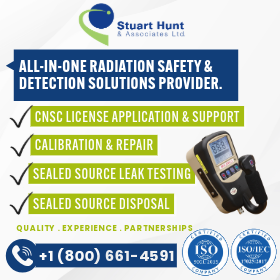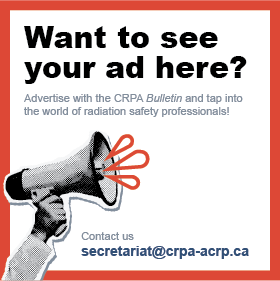L’union fait la force : se regrouper pour la conformité de la radioprotection dans les universités ontariennes
The role of a radiation safety officer
Most Canadian universities that have science and engineering research programs will engage in some research involving radioactive sources. This work can involve open or sealed sources, and the degree of risk it may pose to workers, researchers, and students will vary. To mitigate and manage this risk, universities (like other entities that work with radioactive sources) establish radiation safety programs administered by a radiation safety officer (RSO) or a general health and safety professional who is trained to take on the role of the RSO. Thus, the role and background of university RSOs can be very diverse.
The Council of Ontario Universities
The Council of Ontario Universities (COU) is a non-partisan organization whose mandate is to advance the mission of Ontario universities—promoting student success while driving research and innovation across the province. It does this by working with government, industry, and community stakeholders to develop and review policy, create high-value-added jobs, and foster community economic growth.
COU establishes advisory committees made up of university-subject-matter experts that discuss sector-wide issues, share best practices, address challenges, and propose solutions. One of those advisory committees is the Council of Environmental Health and Safety Officers (CEHSO), which provides a forum for communication, information exchange, and cooperation regarding research health and safety risks.
CEHSO, through COU, is able to lobby for legislative proposals and changes with respect to general health and safety, as well as federal and provincial changes for hazard-specific oversight and compliance affecting the teaching and research community.
Safeguards legislation
The International Atomic Energy Agency (IAEA) is an intergovernmental agency with a mandate to promote the safe use of nuclear energy and inhibit its weaponization. Since the ratification of the Treaty for Non-Proliferation of Nuclear Weapons in 1968, all non-nuclear-weapon states have been required to negotiate a safeguards agreement with IAEA, which has broad authority to monitor nuclear programs and inspect nuclear facilities. In Canada, CNSC enforces the IAEA safeguards requirements through legislation that meets the IAEA requirements.
CNSC’s Nuclear Safety and Control Act requires that facilities working with radioactive materials and sources meet specific criteria through a licensing program. Historically, CNSC was focused on ensuring facilities met their licensing requirements and remained compliant. Now, CNSC has shifted their focus to ensure international obligations are also met. However, in many cases, the international requirements conflict with license conditions, making compliance much more tedious and inefficient.
Ontario Universities Radiation Safety Officers
As RSOs across educational institutions in Ontario began to recognize that they were experiencing similar challenges, they also recognized the potential benefits of pooling their knowledge and experience to try and make a better way forward. The idea was to create a group of individuals with specialized knowledge in radiation protection to facilitate efforts toward efficient and effective nuclear safety and compliance.
The new group is called the Ontario Universities Radiation Safety Officers (OURSO) and is endorsed by COU. The group’s primary mandate is to reduce the risk of university research involving radiation and engage with regulators to be a consultative resource in the development and modification of rules governing work with radiation.
If you are an RSO at an Ontario university and you haven’t heard of this group, reach out to one of our executive members:
- Chair: Dhananjai Borwankar (University of Waterloo), [email protected]
- Vice chair: Daniel Cardenas (University of Toronto), [email protected]
- Secretary: Jessica Hau (York University), [email protected]: Chris Malcolmson (McMaster University), [email protected]
Résumé
Les rôles et les parcours des responsables de la radioprotection (RRP) des universités peuvent être très diversifiés. Lorsque les RRP dans les établissements d’enseignement en Ontario ont commencé à reconnaître qu’ils faisaient face à des défis semblables, ils ont aussi reconnu les avantages potentiels de mettre en commun leurs connaissances et leur expérience. Par conséquent, un nouveau groupe appelé Ontario Universities Radiation Safety Officers (OURSO) a été formé pour réduire le risque qu’il y ait des recherches universitaires comportant des rayonnements et pour engager le dialogue avec des organismes de réglementation à titre de ressource consultative dans le développement et la modification de règles régissant le travail avec les rayonnements.
 Dhananjai Borwankar
Dhananjai Borwankar
Dhananjai a plus de 20 ans d’expérience dans la réduction des risques pour l’environnement et la sécurité dans l’industrie manufacturière, le gouvernement et l’éducation. Il a développé de nombreuses méthodes et outils pour aider à l’évaluation et la réduction des risques. Il travaille actuellement à l’Université de Waterloo à titre de gestionnaire dans le bureau de la sécurité. Il gère les risques pour la sécurité dans toutes les disciplines de recherche en développant des programmes de sécurité et des lignes directrices, en donnant de la formation et en supervisant la délivrance des permis et en autorisant des activités en lien avec la radioprotection et les matières radioactives. Dhananjai possède un diplôme de premier cycle en science de l’environnement, une maîtrise en génie chimique et est un hygiéniste industriel agréé en règle.
Vous voulez lire d’autres articles comme celui-ci ?
Le Bulletin de l’Association canadienne de la radioprotection (ACRP) est une publication essentielle à tout professionnel de la radioprotection du Canada. Son contenu éditorial procure aux professionnels de la radioprotection les enseignements, l’information, les conseils et les solutions utiles, tous nécessaires pour demeurer à l’avant-garde de la profession.
Abonnez-vous aujourd’hui pour que nous vous envoyions un courriel chaque fois qu’un nouveau numéro est mis en ligne. Revisitez souvent le site entre chaque numéro pour obtenir les mises à jour et consulter de nouveaux articles.
Ne ratez aucun numéro. Abonnez-vous dès aujourd’hui !
Abonnez-vous

 Dhananjai Borwankar
Dhananjai Borwankar

